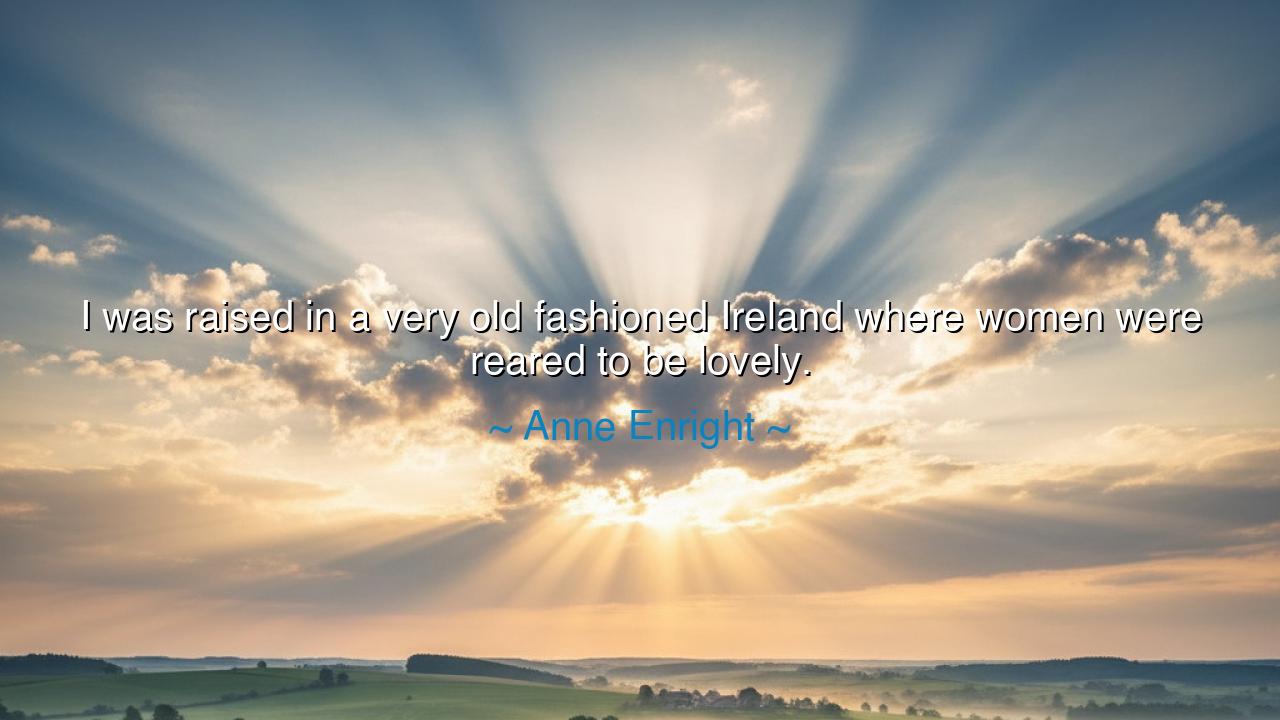
I was raised in a very old fashioned Ireland where women were






Hear, O children of memory and meaning, the words of Anne Enright, who wrote: “I was raised in a very old-fashioned Ireland where women were reared to be lovely.” In this single sentence lies the reflection of a nation, an age, and a struggle — a portrait of womanhood painted with charm and constraint, tenderness and silence. For Enright, a writer whose voice rises from the soil of Ireland’s changing heart, this statement is not merely nostalgia, but revelation — the acknowledgment of how culture once defined the female ideal not by mind or spirit, but by loveliness, by grace that pleases others rather than a strength that serves oneself.
To be “reared to be lovely” was to be trained not in power, but in presentation — to smile, to obey, to move with elegance through the narrow corridors of expectation. In the old Ireland of Enright’s youth, womanhood was measured not by intellect or independence, but by how well one could soothe, host, and endure. A woman’s role was sacred, yes, but also confined — wrapped in religion, respectability, and the soft tyranny of politeness. The phrase “old-fashioned” hides within it generations of women who were told that virtue lay in silence, that loveliness was their crown, even if that crown was heavy as iron.
And yet, there is in Enright’s tone not bitterness, but clarity. For to recognize the past is the first act of liberation. She does not curse the world that shaped her; she reveals it, so that others may see how deeply such conditioning seeps into the soul. Loveliness, she implies, is not wicked in itself — beauty, kindness, and charm are good — but when demanded as a duty rather than offered as a choice, it becomes a form of bondage. To be “reared to be lovely” is to be denied the right to be fierce, flawed, or free.
The truth of her words can be seen across history. Consider Constance Markievicz, Ireland’s revolutionary and the first woman ever elected to the British Parliament. Born into privilege, she was expected to be graceful and genteel, a portrait of loveliness. Yet she cast aside that expectation, took up arms in the 1916 Rising, and declared that “the only thing worth having is freedom.” In her defiance, she embodied the transformation that Enright’s generation inherited — the shift from pleasing to proclaiming, from being admired to being heard.
Enright’s quote also carries a mirror for all societies, not only Ireland. Every culture, in some age or another, has taught its daughters to value appearance over authenticity. It is a universal wound, passed quietly from mother to child, dressed in the language of virtue. Yet the wise know that true loveliness comes not from compliance, but from consciousness — from the courage to think, to question, to live fully as oneself. The “old-fashioned Ireland” of her youth may have taught loveliness as a shield, but the modern woman learns it as a light, one she wields on her own terms.
The lesson that emerges from Enright’s reflection is both gentle and fierce: honor the grace of your foremothers, but do not inherit their silence. Be lovely, yes — but let your loveliness include truth, strength, and intelligence. A smile that hides pain is not beauty; a voice that speaks honestly is. In every era, the measure of womanhood must evolve, from being what the world admires to being what the soul demands.
Thus, let Anne Enright’s words stand as both remembrance and call to renewal: “I was raised in a very old-fashioned Ireland where women were reared to be lovely.” For in remembering that past, we see how far the present has come — and how far yet it must go. Let every daughter of this earth be reared not only to be lovely, but to be wise, to be brave, and above all, to be free.






AAdministratorAdministrator
Welcome, honored guests. Please leave a comment, we will respond soon